The Rauschenberg Project
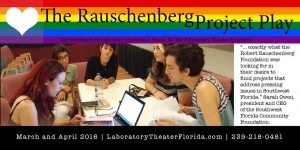 The Rauschenberg Project Plays opens on Thursday at Lab Theater. Written from interviews, stories and poetry submitted by over 150 LGBT young people in Southwest Florida, the play is a collection of scenes, anecdotes, jokes, song, and monologues that track the journey of a group of
The Rauschenberg Project Plays opens on Thursday at Lab Theater. Written from interviews, stories and poetry submitted by over 150 LGBT young people in Southwest Florida, the play is a collection of scenes, anecdotes, jokes, song, and monologues that track the journey of a group of 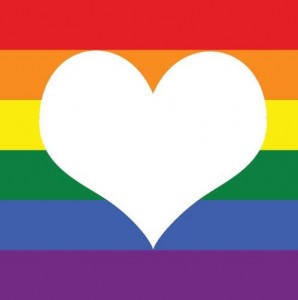 intrepid 14 to 24-year olds who responded to the Rauschenberg Foundation’s challenge to develop a live theatrical production which tells the stories of local young people who identify themselves as lesbian, gay, bisexual or transgender.
intrepid 14 to 24-year olds who responded to the Rauschenberg Foundation’s challenge to develop a live theatrical production which tells the stories of local young people who identify themselves as lesbian, gay, bisexual or transgender.
The play resulted from a partnership forged by the Robert Rauschenberg and Southwest Florida Community Foundations in 2014 to create a vibrant grant program designed to facilitate and support critical social innovation in the region of Southwest Florida. After an exhaustive educational 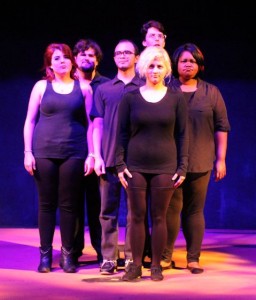 and vetting process overseen by the Southwest Florida Community Foundation, the Rauschenberg Foundation issued five grants totaling $250,000, including a $46,350 grant to the Laboratory Theater of Florida for its Give Youth the Stage program. Since last June, Lab Theater has been assembling and working with local LGBT youth to uncover, develop and present their stories in a theatrical production that promises to inform, astound and enlighten local audiences and celebrate a new generation of young creative people.
and vetting process overseen by the Southwest Florida Community Foundation, the Rauschenberg Foundation issued five grants totaling $250,000, including a $46,350 grant to the Laboratory Theater of Florida for its Give Youth the Stage program. Since last June, Lab Theater has been assembling and working with local LGBT youth to uncover, develop and present their stories in a theatrical production that promises to inform, astound and enlighten local audiences and celebrate a new generation of young creative people.
Performances will be on March 31 and April 1, 2, 4 and 5 at 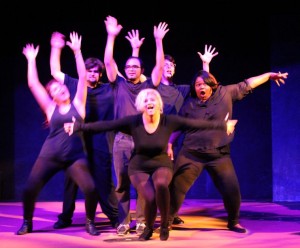 8 p.m. and on April 2 and 3 at 2 p.m. at the theater, which is located at 1634 Woodford Avenue in the Fort Myers River District. Doors open a half hour before each performance. Tickets are available online www.LaboratoryTheaterFlorida.com or by calling 239.218.0481. Tickets are $12 for students and $25 for adults at the door. The theater also offers Thursday night discounts to seniors and military.
8 p.m. and on April 2 and 3 at 2 p.m. at the theater, which is located at 1634 Woodford Avenue in the Fort Myers River District. Doors open a half hour before each performance. Tickets are available online www.LaboratoryTheaterFlorida.com or by calling 239.218.0481. Tickets are $12 for students and $25 for adults at the door. The theater also offers Thursday night discounts to seniors and military.
* * * * * * * * * * * * * * * * * * * * * * * * * * * * * * * * * * * * * * * * * * * * * * * * * * * * * * * * * *
Actors and playwrights Ben Lamoureux and Dave Matthew Chesebro on the making of ‘The Rauschenberg Project Play’ (04-05-16)
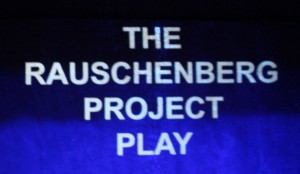 On stage now at Lab Theater in the River Disrict is The Rauschenberg Project Play. The ensemble cast consists of Juan Alejandro, Cantrella Canady, Rosie DeLeon, Isaac Espinoza, Joel Hawkins, Sage Meyers, Luke Nelson, Kendra Weaver, Dave Matthew Chesebro and Ben Lamoureux. Chesebro and Lamoureux also served as part of the
On stage now at Lab Theater in the River Disrict is The Rauschenberg Project Play. The ensemble cast consists of Juan Alejandro, Cantrella Canady, Rosie DeLeon, Isaac Espinoza, Joel Hawkins, Sage Meyers, Luke Nelson, Kendra Weaver, Dave Matthew Chesebro and Ben Lamoureux. Chesebro and Lamoureux also served as part of the 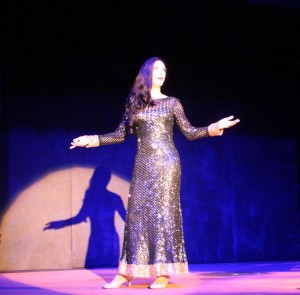 playwriting team that turned scores of interviews into a tightly-woven fabric of what it’s like to be a 14 to 20-something LBGT youth or young adult living, working and going to school right here in Southwest Florida.
playwriting team that turned scores of interviews into a tightly-woven fabric of what it’s like to be a 14 to 20-something LBGT youth or young adult living, working and going to school right here in Southwest Florida.
Some ten months ago, the Robert Rauschenberg and Southwest Florida Community Foundations gave Lab Theater a $46,350 grant to develop a live theatrical production which tells the stories of up to 200 local young people who identify themselves as lesbian, gay, bisexual or transgender. Neither Chesebro nor 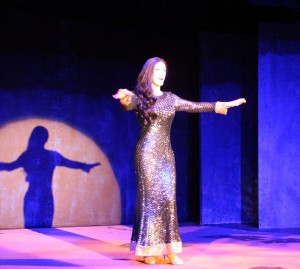 Lamoureux participated in the tricky, occasionally contentious interview sessions at high school and college GSAs. By the time they met with Lab Theater director and playwright Louise Wigglesworth and her team of playwrights, the respondents’ answers to the ten questions posed to them by Lab Theater Artistic Director Annette Trossbach and her interviewer team had been typed, printed and compiled in notebooks. But Chesebro, Lamoureux and the other members
Lamoureux participated in the tricky, occasionally contentious interview sessions at high school and college GSAs. By the time they met with Lab Theater director and playwright Louise Wigglesworth and her team of playwrights, the respondents’ answers to the ten questions posed to them by Lab Theater Artistic Director Annette Trossbach and her interviewer team had been typed, printed and compiled in notebooks. But Chesebro, Lamoureux and the other members 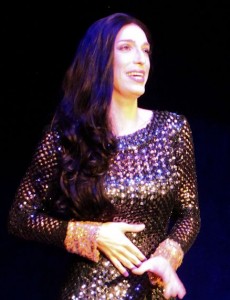 of the playwriting team had no idea what the respondents sounded like, looked like or even their exact ages. At that juncture, all they had as raw material for the play was words on page.
of the playwriting team had no idea what the respondents sounded like, looked like or even their exact ages. At that juncture, all they had as raw material for the play was words on page.
“We started looking at how to piece their answers together into a script,” recalls Lamoureux. Although there were a couple of instances where the playwrights amalgamated several stories into one scene, most of the time the team gravitated to some singular story that really stood out. “There were some that really struck us as ‘that’s a scene,’” Lamoureux explains. “For example, the scene where the kids are asked to come up with 10 adjectives that 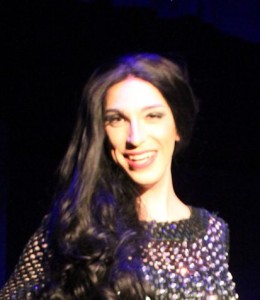 described them and [Cantrella Canady’s character] answers, ‘gay, gay, gay, gay, gay,’ that was actually in one of the notebooks that we had and we said ‘That’s a scene’ the minute we read it.”
described them and [Cantrella Canady’s character] answers, ‘gay, gay, gay, gay, gay,’ that was actually in one of the notebooks that we had and we said ‘That’s a scene’ the minute we read it.”
Typically, one member of the group would write up the scene, give it to Louise Wigglesworth, who would then disseminate the draft among the group, who would then go back and forth with it until they were happy with the outcome. But throughout the process, it was generally understood by the scriptwriters, to a person, that they should produce each scene in the same way the 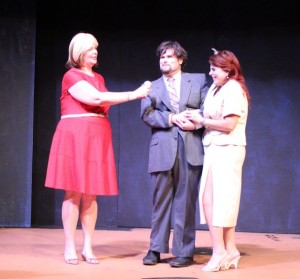 interviewees had shared their stories. That meant relating them first hand rather than through the customary theatrical device of scripted, third-person scenes. “We are describing how these people experienced what happened to them rather than acting that out,” Ben explains. “With monologues, someone can communicate how they’re feeling rather than asking the audience to glean that from a scene where there’s all these other people to watch.” In essence, since the
interviewees had shared their stories. That meant relating them first hand rather than through the customary theatrical device of scripted, third-person scenes. “We are describing how these people experienced what happened to them rather than acting that out,” Ben explains. “With monologues, someone can communicate how they’re feeling rather than asking the audience to glean that from a scene where there’s all these other people to watch.” In essence, since the 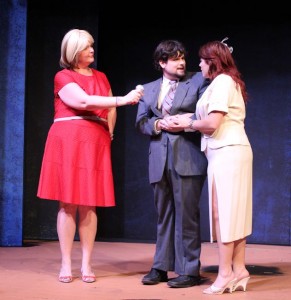 respondents were telling their stories in the first person, that seemed more natural than rendering the scenes in third person point of view.
respondents were telling their stories in the first person, that seemed more natural than rendering the scenes in third person point of view.
“That’s the practical reason as to why the production was written as it was,” nods Dave Chesebro. “But we’re not telling these stories literally. We’re telling how these experiences affected the people who are telling the stories. The scene about Lana (whose first love is a girl by the name of Victoria that she meets in ballet class) is not about what happened, but what it’s done to her – how she is now and what it’s done 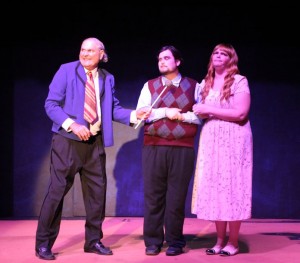 to her Faith. That’s such a strong, strong key to her story. You can be gay and have religion too.”
to her Faith. That’s such a strong, strong key to her story. You can be gay and have religion too.”
But maintaining that sharp line of demarcation proved problematic for even the most experienced actors, as Lamoureux was reminded by Annette Trossbach after the final dress rehearsal. “Don’t relive your character’s experience while you’re telling the story of how his father broke a glass table over his head and beat him senseless with a broom stick when he tells his dad that he is 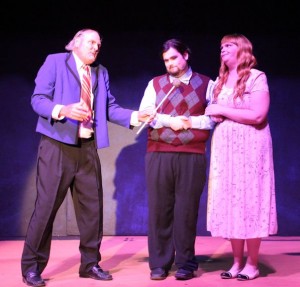 gay,” Trossbach admonished. “It’s over. You survived it. And your the stronger for it in the here and now.”
gay,” Trossbach admonished. “It’s over. You survived it. And your the stronger for it in the here and now.”
“As actors, we’re depicting our characters after they’ve experienced these things,” Ben nods, understanding immediately the distinction Trossbach is attempting to convey. “I’m supposed to show what I’ve become as a result of what happened to me.” It’s the old Friedrich Nietzsche adage from Will to Power that what does not kill me only serves to make me stronger.
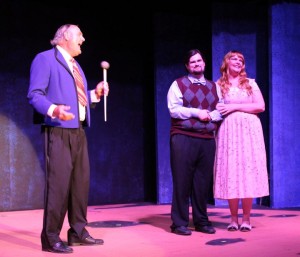 “Exactly,” says Dave, affirming this insight. “You’re seeing the people who told the story in the aftermath of the experience they’re relating. That’s what we’re trying to capture.”
“Exactly,” says Dave, affirming this insight. “You’re seeing the people who told the story in the aftermath of the experience they’re relating. That’s what we’re trying to capture.”
Still, the scriptwriters needed a way to unite the otherwise disjointed stories conveyed by the respondents in answer to the questions posed by Trossback and her interview team. “I’m not sure whether it was Annette or Louise who decided to 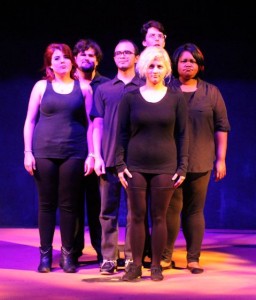 use the questions themselves to segue’ from one scene to the next,” says Ben. “But it was brilliant. It’s structurally very reminiscent to A Chorus Line.”
use the questions themselves to segue’ from one scene to the next,” says Ben. “But it was brilliant. It’s structurally very reminiscent to A Chorus Line.”
The approach not only enabled the playwriting group to remain true to the stories themselves, it gave them a vehicle for simultaneously expressing the fears and reservations the respondents felt about giving up their stories in the first place. “I actually think that is one of the most stealthily powerful things about the show,” Dave remarks. “In that first scene, the interviewers tell the kids they’ve approached, ‘We want to take your words and invite 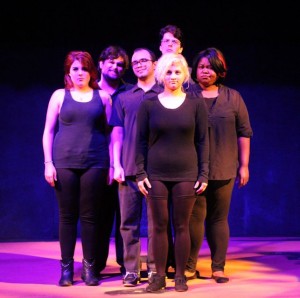 the world to treat you nicer,’ and their response is ‘Why do you want to do this? What is the real motivation? Why should we trust you to be true to our stories? Why should be believe you’re not going to just exploit us?’”
the world to treat you nicer,’ and their response is ‘Why do you want to do this? What is the real motivation? Why should we trust you to be true to our stories? Why should be believe you’re not going to just exploit us?’”
In the end, they made a leap of faith, which both Chesebro and Lamoureux acknowledge and appreciate.
“To the 196 LGBT teens and young adults who took part in this, I’d just like to say thank you for your bravery.”
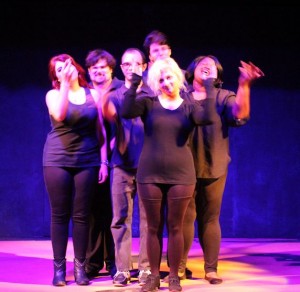 “Yes,” Ben chimes in. “Thank you for sharing your stories and allowing the community to see and understand that there’s so much more to being LGBT.”
“Yes,” Ben chimes in. “Thank you for sharing your stories and allowing the community to see and understand that there’s so much more to being LGBT.”
“Thank you,” Dave reiterates. With eyes searching a distant, unseen horizon, he appends his earlier statement. “I am honored to be working with such personal stories.”
That sense of honor and humility is shared by all of the playwright, actors, directors, and others who’ve 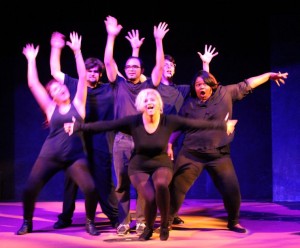 participated in The Rauschenberg Project Play. “These are the actual words of young people some of whom we know,” Trossbach reminds Ben, Dave and the rest of the team after the final dress rehearsal. “Some submitted their answers anonymously or through their GSAs, but I said it to you before and I’m saying tonight again how humble it has been to be able to work on this project. I hope our audiences are moved by what
participated in The Rauschenberg Project Play. “These are the actual words of young people some of whom we know,” Trossbach reminds Ben, Dave and the rest of the team after the final dress rehearsal. “Some submitted their answers anonymously or through their GSAs, but I said it to you before and I’m saying tonight again how humble it has been to be able to work on this project. I hope our audiences are moved by what 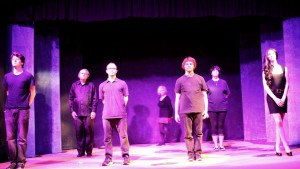 they see here each night. It’s a really great story. One that should be told. One that should be told beyond the community of Southwest Florida, as well.”
they see here each night. It’s a really great story. One that should be told. One that should be told beyond the community of Southwest Florida, as well.”
Come see for yourself.
See above for remaining play dates, times and ticket information.
______________________________________________________________________________
Lab Theater stage director Kate Dirrigl hopes Robert Rauschenberg Project Play empowers local LGBT youth (04-04-16)
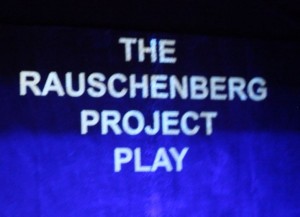 On stage now at Lab Theater in the River District is The Rauschenberg Project Play, a series of poignant, laughable, heart-wrenching and brutally honest vignettes about what it’s like to be a 14 to 25 year old LGBT Southwest Florida student or young adult. Directed by Artistic Director Annette Trossbach, the play stars (alphabetically) Juan Alejandro, Cantrella Canady, Dave Matthew
On stage now at Lab Theater in the River District is The Rauschenberg Project Play, a series of poignant, laughable, heart-wrenching and brutally honest vignettes about what it’s like to be a 14 to 25 year old LGBT Southwest Florida student or young adult. Directed by Artistic Director Annette Trossbach, the play stars (alphabetically) Juan Alejandro, Cantrella Canady, Dave Matthew 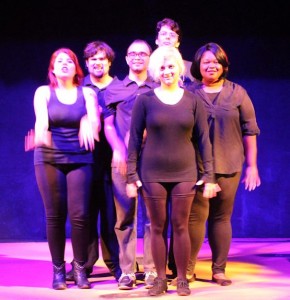 Chesebro, Rose DeLeon, Isaac Espinosa, Joel Hawkins, Ben Lamoureux, Sage Meyers, Luke Nelson and Kendra Weaver. Even when there are only four or five actors in a cast, it’s not always easy making sure everyone gets to where they’re supposed to be when they’re supposed to be there, but with a team of actors this large and involved, the logistics can be a nightmare. Not so in this production, thanks to Kate Dirrigl, who serves as stage manager for The Rauschenberg Project Play.
Chesebro, Rose DeLeon, Isaac Espinosa, Joel Hawkins, Ben Lamoureux, Sage Meyers, Luke Nelson and Kendra Weaver. Even when there are only four or five actors in a cast, it’s not always easy making sure everyone gets to where they’re supposed to be when they’re supposed to be there, but with a team of actors this large and involved, the logistics can be a nightmare. Not so in this production, thanks to Kate Dirrigl, who serves as stage manager for The Rauschenberg Project Play.
When she wasn’t updating and distributing 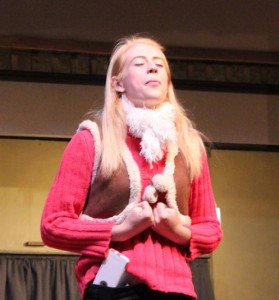 schedules, sending and responding to email, and generally making sure that everyone and everything came together and happened when it was supposed to, Kate was whiling away her spare time learning lines, rehearsing and performing as Dancer in The Eight: Reindeer Monologues and as Melody in Bad Jews. “Bad Jews ended its run on Saturday night and I was back at the theater on Easter working on The Rauschenberg Project Play.”
schedules, sending and responding to email, and generally making sure that everyone and everything came together and happened when it was supposed to, Kate was whiling away her spare time learning lines, rehearsing and performing as Dancer in The Eight: Reindeer Monologues and as Melody in Bad Jews. “Bad Jews ended its run on Saturday night and I was back at the theater on Easter working on The Rauschenberg Project Play.”
She also had the advantage of getting to watch the play take shape, evolve and gel in the days leading up to last 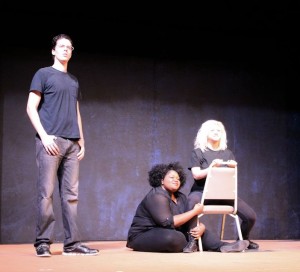 Thursday night’s opening. Following its receipt of a grant from the Robert Rauschenberg and Southwest Florida Community Foundations, Lab Theater elicited verbal and written stories from scores of local LGBT youths. Under the direction of Lab Theater director/playwright Louise Wigglesworth, a team of some three to six LGBT youths then converted those oral and written histories into a script. The actors then massaged that script, tweaking it, adding and deleting
Thursday night’s opening. Following its receipt of a grant from the Robert Rauschenberg and Southwest Florida Community Foundations, Lab Theater elicited verbal and written stories from scores of local LGBT youths. Under the direction of Lab Theater director/playwright Louise Wigglesworth, a team of some three to six LGBT youths then converted those oral and written histories into a script. The actors then massaged that script, tweaking it, adding and deleting 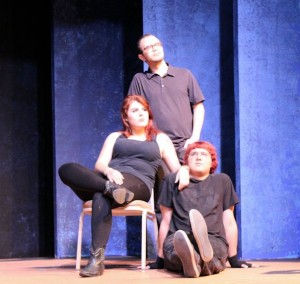 scenes, fine-tuning the dialogue and making other changes on the fly as they rehearsed and began performing the play. “Audiences will see an honest representation of what it is like to be LGBT in Southwest Florida,” Kate states of the final product, having watched much of the process from her position stage right, stage left and on the proscenium floor.
scenes, fine-tuning the dialogue and making other changes on the fly as they rehearsed and began performing the play. “Audiences will see an honest representation of what it is like to be LGBT in Southwest Florida,” Kate states of the final product, having watched much of the process from her position stage right, stage left and on the proscenium floor.
“Some of the stories depict what actual happened to a particular person while others are fictionalized – 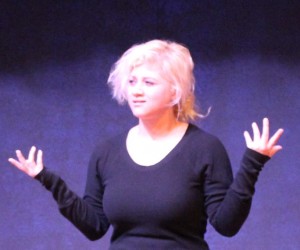 composites of incidents experienced by several LGBT kids,” notes Kate. “It’s easy to figure out which are which.” But what impresses Dirrigl most is the way the playwriting team was able to braid serious themes with lighthearted, satirical material. “It’s hard to talk about LGBT issues such as homelessness, bullying and suicide without having some lightheartedness to counterbalance that. It was important to strike a balance between
composites of incidents experienced by several LGBT kids,” notes Kate. “It’s easy to figure out which are which.” But what impresses Dirrigl most is the way the playwriting team was able to braid serious themes with lighthearted, satirical material. “It’s hard to talk about LGBT issues such as homelessness, bullying and suicide without having some lightheartedness to counterbalance that. It was important to strike a balance between 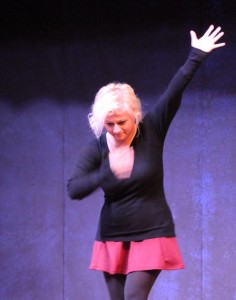 what is happening and what’s going to be enjoyable for the audience to watch without depressing them. I think we achieved that mix”
what is happening and what’s going to be enjoyable for the audience to watch without depressing them. I think we achieved that mix”
Those who’ve reviewed and seen the play so far agree with Kate’s assessment. But the challenge right now is inducing people to come to the theater to take in the show. Some community theater-goers will buy tickets out of mere curiosity. Some will come out to the show because they know a cast member or one of the 196 LGBT youths who played a role in the project. But others will avoid The Rauschenberg Project Play precisely because it involves LGBT scenes and themes (just as 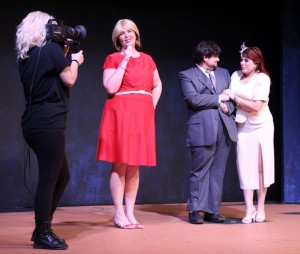 some in our community avoided and even criticized the theater for staging shows like The Laramie Project or last summer’s The Gay Marriage Plays).”
some in our community avoided and even criticized the theater for staging shows like The Laramie Project or last summer’s The Gay Marriage Plays).”
“We can spread the word, invite as many people as possible to come to the show and those who do come are going to learn something and take something from this and gain tolerance and acceptance and understanding,” Dirrigl predicts. 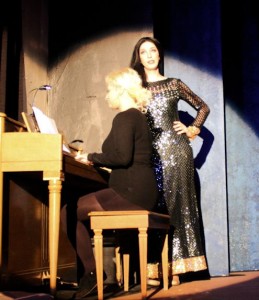 “[Sexual orientation and gender assignment] are not a choice. But there are also going to be people who leave this theater at the end of the night who still won’t understand or accept that. We can only do our best as artists to educate and all we can hope for is that some of the audience are moved and find something that resonates with them. That’s my hope for the project. “
“[Sexual orientation and gender assignment] are not a choice. But there are also going to be people who leave this theater at the end of the night who still won’t understand or accept that. We can only do our best as artists to educate and all we can hope for is that some of the audience are moved and find something that resonates with them. That’s my hope for the project. “
Among those who may not come to the show are some of the 196 LGBT students who took part in the project. Many are not out and cannot risk being seen at a play by and about local LGBT youths. “But visibility is important,” 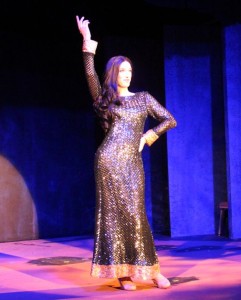 observes Dirrigl nonetheless. With visibility comes greater understanding. It took that kind of visibility to lead to the psychosocial changes that inspired President Barrack Obama and Vice-President Joe Biden to publicly declare their support for gay marriage and set the predicate for the Supreme Court’s decision recognizing a constitutional right to same sex marriage. But notwithstanding that advance in gay and lesbian rights, many if not most LGBT youth here in Southwest Florida still lead desperate, isolated and alienated lives.
observes Dirrigl nonetheless. With visibility comes greater understanding. It took that kind of visibility to lead to the psychosocial changes that inspired President Barrack Obama and Vice-President Joe Biden to publicly declare their support for gay marriage and set the predicate for the Supreme Court’s decision recognizing a constitutional right to same sex marriage. But notwithstanding that advance in gay and lesbian rights, many if not most LGBT youth here in Southwest Florida still lead desperate, isolated and alienated lives.
“Locally in Florida we don’t really have many strong organizations that resonate with the 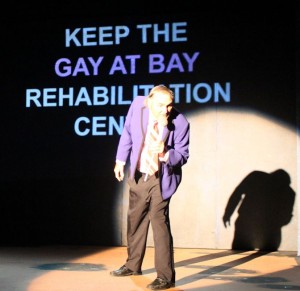 gay/lesbian/bisexual/transgender community outside of high school or college GSAs,” Kate points out. “We don’t really have anything as you enter the adult, workplace world – those same support services that you have when you’re younger.”
gay/lesbian/bisexual/transgender community outside of high school or college GSAs,” Kate points out. “We don’t really have anything as you enter the adult, workplace world – those same support services that you have when you’re younger.”
But it is that kind of support network that our local LGBT youths need most. “They are looking for relief, for someone to tell them it’s okay to be who you are and we’re happy to have you here. We’ll take you in. We’ll accept you.”
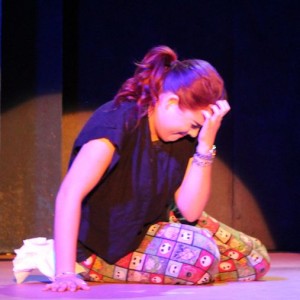 If the past is any indication of the future, it will take greater understanding of the unique issues faced by LGBTQ youth before that kind of acceptance can and will happen. And as with same sex marriage, understanding follows visibility. But visibility comes at a price – a price too great for many kids to pay. For now at least, anonymity is a matter of survival and self-preservation. The Rauschenberg Project Play, though, allows them to share their stories, tell people what it’s like to live in a faceless, underground culture, to gain
If the past is any indication of the future, it will take greater understanding of the unique issues faced by LGBTQ youth before that kind of acceptance can and will happen. And as with same sex marriage, understanding follows visibility. But visibility comes at a price – a price too great for many kids to pay. For now at least, anonymity is a matter of survival and self-preservation. The Rauschenberg Project Play, though, allows them to share their stories, tell people what it’s like to live in a faceless, underground culture, to gain 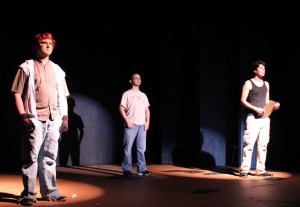 greater visibility without exposing themselves to the risks, dangers and indignities of going public with their status.
greater visibility without exposing themselves to the risks, dangers and indignities of going public with their status.
“I hope those kids feel empowered by this,” Kate concludes. “I hope they are happy with the way we presented their stories. And I hope that they find some resolution with whatever issues they may be dealing with, whether it’s related to their parents 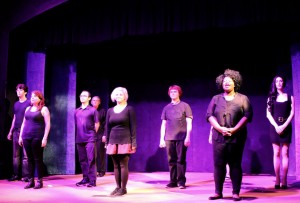 not understanding, or whether it’s related to problems they’re having at school. I hope they know just how honored we are to share their stories, but that they also feel empowered by what we’ve done.”
not understanding, or whether it’s related to problems they’re having at school. I hope they know just how honored we are to share their stories, but that they also feel empowered by what we’ve done.”
Please see above for remaining play dates, times and ticket information.
_____________________________________________________________________________
New Lab Theater play gives voice to life experiences of Southwest Florida LGBT youths (03-31-16)
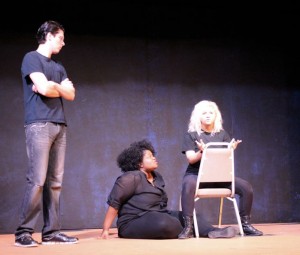 A new play opening tonight at Laboratory Theater in downtown Fort Myers gives voice to the life experiences of local LGBT youths. And if you think their lives have gotten better in the aftermath of the Supreme Court’s decision recognizing same sex marriage and Caitlyn Jenner’s very public sex change operation, you could not be more wrong. As the play’s various scenes and vignettes powerfully convey, many – if not most – of Southwest Florida LGTB teens and young adults still face
A new play opening tonight at Laboratory Theater in downtown Fort Myers gives voice to the life experiences of local LGBT youths. And if you think their lives have gotten better in the aftermath of the Supreme Court’s decision recognizing same sex marriage and Caitlyn Jenner’s very public sex change operation, you could not be more wrong. As the play’s various scenes and vignettes powerfully convey, many – if not most – of Southwest Florida LGTB teens and young adults still face 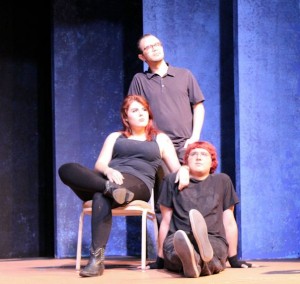 ridicule, bullying, alienation and even physical abuse at the hands of their families, peers and members of the surrounding community.
ridicule, bullying, alienation and even physical abuse at the hands of their families, peers and members of the surrounding community.
Not that local LGBT youths wanted their stories told. When Lab Theater Artistic Director Annette Trossbach approached area GSAs (Gay Student Associations) with the offer to elicit and present their stories in an experimental play underwritten by a grant from the Robert Rauschenberg and Southwest Florida Community Foundations, she 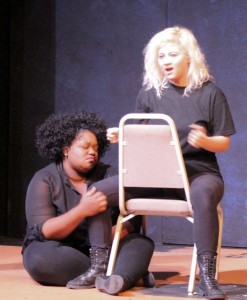 was met by almost-insurmountable suspicion, distrust and outright hostility. “We thought they’d relish the opportunity to get their stories out there,” says Trossbach wistfully. “It was the exact opposite.”
was met by almost-insurmountable suspicion, distrust and outright hostility. “We thought they’d relish the opportunity to get their stories out there,” says Trossbach wistfully. “It was the exact opposite.”
Evoking memories of A Chorus Line, The Rauschenberg Project Play opens with an unseen interviewer asking six young people a series of ten questions about their experiences as LGBTs. They voice the very objections that Trossbach heard at the start of the project some ten months ago. “What right do they have to my story?” says a character played by Juan Alejandro. “What are they going to do with it?” 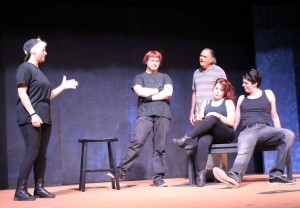 asks another. “They just want to exploit us,” declares a boy with red-dyed hair. “Turn our stories into a play, put it on stage and make money off of us.” Reflecting the sentiment of the 14 to 25-year-olds they were playing, the actors argue among themselves over whether to trust the adult female voice metaphorically coming at them from some unknown and possibly threatening place
asks another. “They just want to exploit us,” declares a boy with red-dyed hair. “Turn our stories into a play, put it on stage and make money off of us.” Reflecting the sentiment of the 14 to 25-year-olds they were playing, the actors argue among themselves over whether to trust the adult female voice metaphorically coming at them from some unknown and possibly threatening place 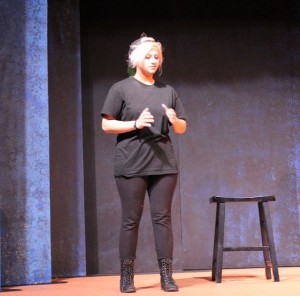 completely out of view and their control.
completely out of view and their control.
“These kids have survived by not being the center of attention,” concedes Trossbach. “They’ve made it as far as they have by slipping into the background, by not talking to outsiders. So contrary to our expectations, they were content to keep their lives and stories private.”
For a time, it seemed that the project might founder. But with the advice and counsel of the Southwest Florida Community Foundation and 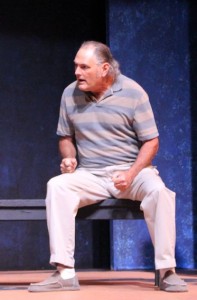 Rauschenberg “tribe leaders” on the ground here in Southwest Florida, Lab Theater devised tools like private Facebook groups and secret email addresses that allowed local LGBTs to write and submit their stories. From there, a group of 4-6 writers working under the direction of local actor, director and playwright Louise Wigglesworth converted them into a script for a nearly two-hour stage play. At that point, the “cast” reworked the script, tweaking the dialogue, adding and deleting scenes and making other adjustments. Individually and as a group, the writers, directors and actors to took great pains to find ways to stage and portray the very personal, often funny, all-too-poignant stories of the 196 local LGBTs who made contributions to the project without embellishment or exaggeration.
Rauschenberg “tribe leaders” on the ground here in Southwest Florida, Lab Theater devised tools like private Facebook groups and secret email addresses that allowed local LGBTs to write and submit their stories. From there, a group of 4-6 writers working under the direction of local actor, director and playwright Louise Wigglesworth converted them into a script for a nearly two-hour stage play. At that point, the “cast” reworked the script, tweaking the dialogue, adding and deleting scenes and making other adjustments. Individually and as a group, the writers, directors and actors to took great pains to find ways to stage and portray the very personal, often funny, all-too-poignant stories of the 196 local LGBTs who made contributions to the project without embellishment or exaggeration.
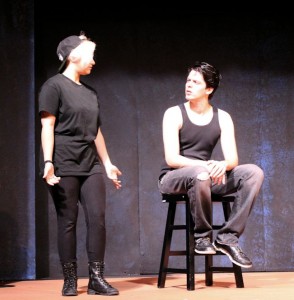 “We felt a tremendous responsibility to remain true to the stories they shared with us,” states actor and playwright Ben Lamoureux.
“We felt a tremendous responsibility to remain true to the stories they shared with us,” states actor and playwright Ben Lamoureux.
“They put themselves out there,” adds fellow thespian and playwright Dave Matthew Chesebro. “Their stories speak for themselves.”
And for that reason, the Robert Rauschenberg Project Play is presented as a series of vignettes and monologues in which the actors talk about incidents and experiences that have happened during their 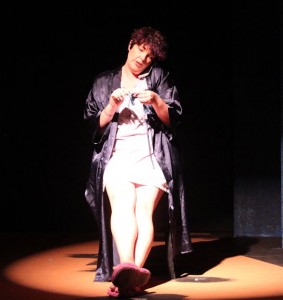 young lives. But as these are true stories gleaned from real life and not caricatures or stereotypes, the experiences conveyed to the audience vary sharply. For example, while one teen’s mom says, “I wondered how long it would take you to figure it out” when her son finally tells her over the telephone that he’s gay, and then quips that “now we can finally go shopping together, a young adult in full drag recounts that when he told his dad, his father picked him up, slammed him to the ground, broke a glass table over his head and then beat him with a broom until the handle
young lives. But as these are true stories gleaned from real life and not caricatures or stereotypes, the experiences conveyed to the audience vary sharply. For example, while one teen’s mom says, “I wondered how long it would take you to figure it out” when her son finally tells her over the telephone that he’s gay, and then quips that “now we can finally go shopping together, a young adult in full drag recounts that when he told his dad, his father picked him up, slammed him to the ground, broke a glass table over his head and then beat him with a broom until the handle 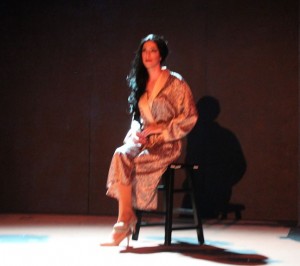 finally broke. Another teem wonders if his parents saw him walk the stage at graduation. He kind of doubts it. They kicked him out five months ago and he’s been living in a junker he bought with money he earned over the summer working at an Applebys, showering in the locker room at 5:00 a.m. and living off school breakfasts and lunches and really cheap fast foods.
finally broke. Another teem wonders if his parents saw him walk the stage at graduation. He kind of doubts it. They kicked him out five months ago and he’s been living in a junker he bought with money he earned over the summer working at an Applebys, showering in the locker room at 5:00 a.m. and living off school breakfasts and lunches and really cheap fast foods.
While there are, to be sure, heart-wrenching and heartbreaking stories like these, there’s a great 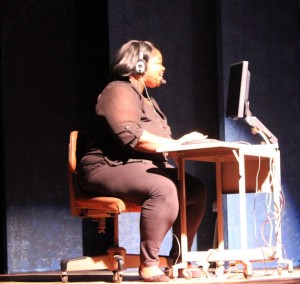 deal of humor and self-deprecation to be found in this play, such as a clever vignette in which a young man tries to buy tickets over the phone to an LGBT-themed show from a woman named Dim Kavis who refuses to make the sale for moral and religious reasons even though it’s her job to sell him the tickets. In fact, the writers have done an admirable job of juxtaposing humor with horror throughout the play, as they did when they followed a scene in which a sleazy silver-tongued purveyor of a gay-conversion facility called
deal of humor and self-deprecation to be found in this play, such as a clever vignette in which a young man tries to buy tickets over the phone to an LGBT-themed show from a woman named Dim Kavis who refuses to make the sale for moral and religious reasons even though it’s her job to sell him the tickets. In fact, the writers have done an admirable job of juxtaposing humor with horror throughout the play, as they did when they followed a scene in which a sleazy silver-tongued purveyor of a gay-conversion facility called 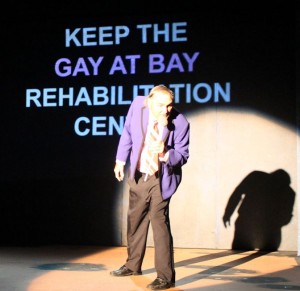 Gay at Bay convinces two parents to send their daughter to his retreat with an almost nonverbal after-story in which the daughter of those parents decides to kill herself rather than be sent away. It’s not a singular choice. More than 2,000 LGBTs have committed suicide or been killed in hate crimes.
Gay at Bay convinces two parents to send their daughter to his retreat with an almost nonverbal after-story in which the daughter of those parents decides to kill herself rather than be sent away. It’s not a singular choice. More than 2,000 LGBTs have committed suicide or been killed in hate crimes.
There are many reasons to see this play. It is well-written. It is well-conceived. The acting is as good as it is heartfelt. But the Robert Rauschenberg Project Play represents a rare and unique 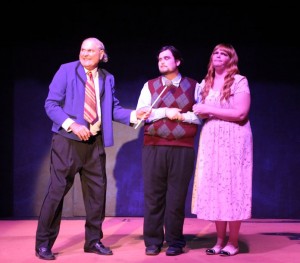 opportunity to walk in the shoes of young LGBTs. All teens and young adults struggle to figure out who they are and who they’d like to be. This is a time when each young person feels tremendous pressure to conform to a norm that is set by various ill-defined peer groups. Individuality is only tolerated within narrow parameters and those who appear too different are subjected to the sting of ridicule, discrimination, stigma, rejection and oft-times bullying. These
opportunity to walk in the shoes of young LGBTs. All teens and young adults struggle to figure out who they are and who they’d like to be. This is a time when each young person feels tremendous pressure to conform to a norm that is set by various ill-defined peer groups. Individuality is only tolerated within narrow parameters and those who appear too different are subjected to the sting of ridicule, discrimination, stigma, rejection and oft-times bullying. These 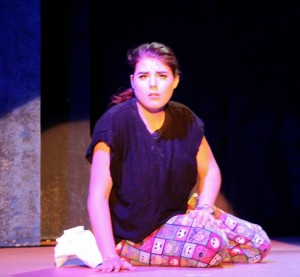 pressures are exacerbated for youngsters who are gay, lesbian, bisexual and transgender. And so, for obvious reasons, it is in the best interests of LGBT teens and young adults to keep their status and stories private. To remain in the shadows. To live underground.
pressures are exacerbated for youngsters who are gay, lesbian, bisexual and transgender. And so, for obvious reasons, it is in the best interests of LGBT teens and young adults to keep their status and stories private. To remain in the shadows. To live underground.
But non-LGBTs will only begin to embrace those in the LGBT community to the extent they experience that gay and lesbian boys and girls, men and 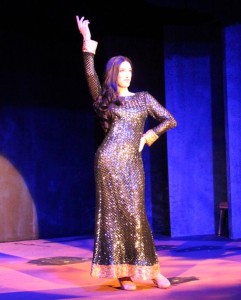 women, bisexuals and transgenders are, in the final analysis, just people who are struggling to find love and happiness and live authentically in a very troubled, troubling and inauthentic world. It was only as people in the general population got to know and interact with gay and lesbian adults that their fears and sense of opprobrium lessened. It took decades, but today more than 60 percent of Americans support gay marriage and gay rights. But LGBT teens and young adults cannot make this overture to their straight counterparts. The risks are too great. It is up to us to exercise intellectual curiosity. It is up to us to be sympathetic. It is up to us to create an environment in
women, bisexuals and transgenders are, in the final analysis, just people who are struggling to find love and happiness and live authentically in a very troubled, troubling and inauthentic world. It was only as people in the general population got to know and interact with gay and lesbian adults that their fears and sense of opprobrium lessened. It took decades, but today more than 60 percent of Americans support gay marriage and gay rights. But LGBT teens and young adults cannot make this overture to their straight counterparts. The risks are too great. It is up to us to exercise intellectual curiosity. It is up to us to be sympathetic. It is up to us to create an environment in  which understanding and empathy can germinate, take root and blossom.
which understanding and empathy can germinate, take root and blossom.
But there’s more.
Do not just go to this play to be entertained. That’s the lazy way out. Go with an open mind and an open heart. Let the stories of our local LGBT high school, college and young working adults resonate with you. And keep those stories in mind the next time someone makes a crude homophobic joke or tells you that something or someone is “gay.” Our local LGBT community doesn’t want you to patronize them  by patronizing this play. They want their stories to change who you are, how you think, and the way you live. Unfortunately, they’ve seen little evidence of that in our community so far.
by patronizing this play. They want their stories to change who you are, how you think, and the way you live. Unfortunately, they’ve seen little evidence of that in our community so far.
Please see above for play dates, times and ticket information.
________________________________________________________________
Supreme Court’s gay marriage decision and Caitlyn Jenner may make life even tougher for area’s transgender people (06-26-15)
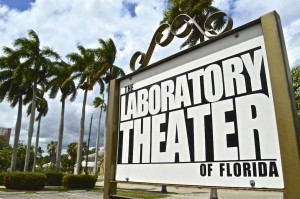 Something interesting is happening at the Laboratory Theater of Florida. As you may have heard, Lab Theater received a grant several weeks ago from the Robert Rauschenberg Foundation to develop a live theatrical production that tells the stories of local teens and young adults who identify themselves as lesbian, gay, bisexual or transgender. Toward that end, a
Something interesting is happening at the Laboratory Theater of Florida. As you may have heard, Lab Theater received a grant several weeks ago from the Robert Rauschenberg Foundation to develop a live theatrical production that tells the stories of local teens and young adults who identify themselves as lesbian, gay, bisexual or transgender. Toward that end, a 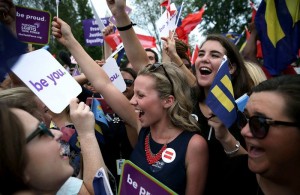 cadre of young LGBTQ teens and young adults are meeting right now with 12 to 24-year-old Southwest Florida LGBTQs to record their unique life stories. Many, within and outside that community, are wondering how today’s 5-4 Supreme Court decision recognizing the right of gays to marry in all 50 states will impact the lives of young LGBTQ boys
cadre of young LGBTQ teens and young adults are meeting right now with 12 to 24-year-old Southwest Florida LGBTQs to record their unique life stories. Many, within and outside that community, are wondering how today’s 5-4 Supreme Court decision recognizing the right of gays to marry in all 50 states will impact the lives of young LGBTQ boys 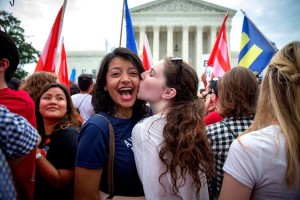 and girls, men and women, and their decision to announce their status to family, friends, and their high school and college communities.
and girls, men and women, and their decision to announce their status to family, friends, and their high school and college communities.
All teens and young adults struggle to figure out who they are and who they’d like to be. This is a time when each young person feels tremendous pressure to conform to a norm that is set by 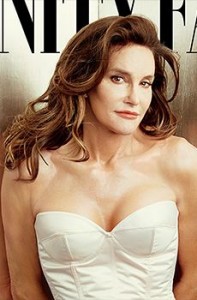 various ill-defined peer groups. Individuality is only tolerated within narrow parameters and those who appear too different are subjected to the sting of ridicule, discrimination, stigma, rejection and oft-times bullying. These pressures are exacerbated for youngsters who are gay, lesbian, bisexual and transgender. It is unlikely that today’s Supreme Court pronouncement or Caitlyn Jenner’s recent decision to come out as a transgender woman will make it any easier for young LGBTQ boys and girls to divulge or conceal their gender identity and sexual orientation. In fact, the Jenner announcement may have made life more, rather than less, difficult for transgender boys and girls.
various ill-defined peer groups. Individuality is only tolerated within narrow parameters and those who appear too different are subjected to the sting of ridicule, discrimination, stigma, rejection and oft-times bullying. These pressures are exacerbated for youngsters who are gay, lesbian, bisexual and transgender. It is unlikely that today’s Supreme Court pronouncement or Caitlyn Jenner’s recent decision to come out as a transgender woman will make it any easier for young LGBTQ boys and girls to divulge or conceal their gender identity and sexual orientation. In fact, the Jenner announcement may have made life more, rather than less, difficult for transgender boys and girls.
Most trans sense something’s off, feel that something’s not quite right as 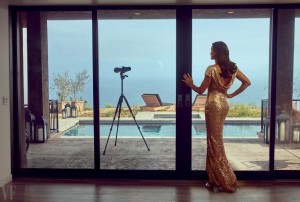 early as age four or five, but they don’t initially question their gender identity. In fact, boys who suspected they were really girls would typically deny their feelings and overcompensate for them by going into risky professions, including the military, in order to man up and find challenges that would enable them to prove their masculinity. Caitlyn Jenner may have been a classic example of this type of reaction, achieving the height of masculine perfection as the Olympic gold medalist in the decathlon. “We marry, we have children, and all the while we hope this will go away,” acknowledges a transgender woman in her fifties who was married for more than 20 years. “Of course, it never does, and then at some point, you reach the breaking point. There is some change in the dynamics of your marriage or your workplace or you just wake up one day and say, ‘Gee, the show is half over and I need to do something about this.’”
early as age four or five, but they don’t initially question their gender identity. In fact, boys who suspected they were really girls would typically deny their feelings and overcompensate for them by going into risky professions, including the military, in order to man up and find challenges that would enable them to prove their masculinity. Caitlyn Jenner may have been a classic example of this type of reaction, achieving the height of masculine perfection as the Olympic gold medalist in the decathlon. “We marry, we have children, and all the while we hope this will go away,” acknowledges a transgender woman in her fifties who was married for more than 20 years. “Of course, it never does, and then at some point, you reach the breaking point. There is some change in the dynamics of your marriage or your workplace or you just wake up one day and say, ‘Gee, the show is half over and I need to do something about this.’”
The internet and media coverage of high profile cases like Caitlyn Jenner have changed this landscape somewhat for the transgender teens of today. Because of the proliferation of information from a host of sources, trans children and teens are better able to understand their gender dysphoria and articulate their gender identity at younger and younger ages. “Transgender people transitioning in high school and college is going to become more and more common,” licensed clinical psychologist and child and family counselor Dr. Nicole Joseph predicted a couple of weeks ago on NPR’s Diane Rehms Show. But that may be overly optimistic.
Few families are likely to openly embrace their child’s desire to change their gender identity. With the cost of sex change surgery and therapists not covered by individual or group health insurance policies, even those families who wish to support their transgender child will rarely have the resources to enable their child transition to their non-biological sex. And if the child is going to transition, it would be best for him or her to do so before they enter the workforce, where there will be enormous pressure to lead a stealth or double life (a’ la Younger). While employers may be prohibited by law from firing a transgender employee outright, all trans know that their employers and co-workers could make their working conditions so miserable that they’d have little choice but to quit.
Given the foregoing, some, perhaps most transgender 12-24-year-olds will continue to keep their true gender identity a well-guarded secret. But the consequence of that decision is a life of inauthenticity with the attendant consequences of elevated anxiety, depression and even suicide. Admittedly, the causes of suicide are complex, but transgender people report much higher rates of contemplated or attempted suicide (41% according to one national survey) than prevail among the general population. “We know it’s not because transgender people are inherently unhappy or unhealthy,” Dr. Joseph stated on the Diane Rehms Show. “It’s social stigma and rejection and discrimination and violence that can only be ameliorated by support from family, schools and the community.”
And therein lies another dilemma for the transgender teen or young adult who chooses to keep their status private for the time being. It was only as people in the general population got to know and interact with gays and lesbians did their fears and sense of opprobrium lessen. It took decades, but today more than 60 percent of Americans support gay marriage and gay rights. Only by coming out and forging personal relationships with outsiders can transgender boys and girls, men and women hope to attain similar cultural acceptance. The Lab Theater Give Youth the Stage Rauschenberg Project affords transgender people who wish to keep their status private with the unique opportunity to get their stories out there, laying the predicate for great social acceptance now and in the years to come, without the need to make their status public.
If you identify yourself as a transgender person and wish to share your story, whether publicly or anonymously, so that it can be weaved into the fabric of a play that will see the stage in March of 2016, please call 239-218-0481 or contact Mr. Spaulding at Visuality@laboratorytheaterflorida.com.
Stay tuned for developments.
_________________________________________________________________________________________
Laboratory Theater wins Rauschenberg Foundation grant to produce play by and about LGBT youths (06-02-15)
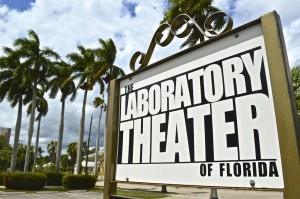 The Laboratory Theater of Florida has been awarded a grant by the Robert Rauschenberg Foundation to develop a live theatrical production which tells the stories of up to 200 local young people who identify themselves as lesbian, gay, bisexual or transgender. The theater will offer young LGBTQs aged 12-24 the opportunity to
The Laboratory Theater of Florida has been awarded a grant by the Robert Rauschenberg Foundation to develop a live theatrical production which tells the stories of up to 200 local young people who identify themselves as lesbian, gay, bisexual or transgender. The theater will offer young LGBTQs aged 12-24 the opportunity to 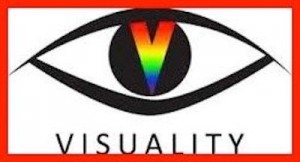 learn the following skills which will be used towards the development of the play:
learn the following skills which will be used towards the development of the play:
- journalism,
- playwriting,
- set design & construction,
- acting,
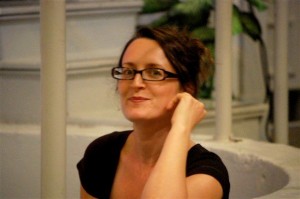 wigs/makeup,
wigs/makeup,- lighting design,
- costume design & construction,
- stage management,
- musical composition, and
- sound.
One of the organizations that Lab Theater will be 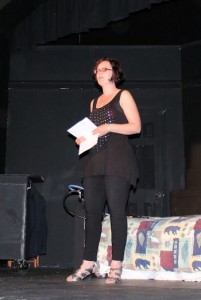 partnering with to attract LGBTQs in the target demographic is Visuality, Inc., a non-profit organization that offers services to LGBTQ youth in Lee County. “What a fabulous opportunity that such a small percentage of people will ever have,” Visuality board member Andrew Spaulding observes. “When I was a kid, I never thought that anyone cared about my story, let alone would want to perform it. Me growing up it was: ‘Okay, you’re gay. Don’t tell grandma. Don’t tell grandpa. We don’t want anyone to know.’”
partnering with to attract LGBTQs in the target demographic is Visuality, Inc., a non-profit organization that offers services to LGBTQ youth in Lee County. “What a fabulous opportunity that such a small percentage of people will ever have,” Visuality board member Andrew Spaulding observes. “When I was a kid, I never thought that anyone cared about my story, let alone would want to perform it. Me growing up it was: ‘Okay, you’re gay. Don’t tell grandma. Don’t tell grandpa. We don’t want anyone to know.’”
Artistic Director Annette Trossbach adds, “The kids that wish to tell their stories to our interviewers may do so anonymously. The goal is to translate to the stage the stories, poems, short scenes that the young 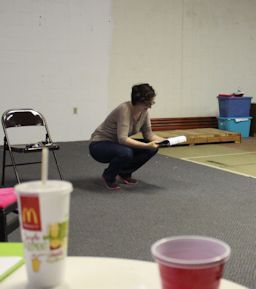 people share with us. We are seeking kids who want to learn journalism and interviewing skills. We are seeking kids who want learn playwriting. We want young people to feel heard and cared for in southwest Florida. We want them to stay here and feel safe here. By getting involved in the project, they have a chance to tell their stories and to help the greater community to understand where they are coming from.”
people share with us. We are seeking kids who want to learn journalism and interviewing skills. We are seeking kids who want learn playwriting. We want young people to feel heard and cared for in southwest Florida. We want them to stay here and feel safe here. By getting involved in the project, they have a chance to tell their stories and to help the greater community to understand where they are coming from.”
The classes will be free for participants and will meet once per week for ten weeks each, with Journalism starting in 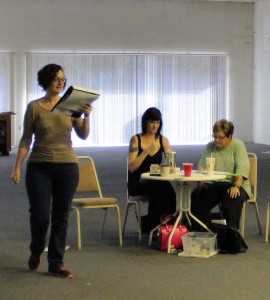 June. The theater may be contacted for further information at 239.218.0481. More information will also be posted on Facebook, on The Laboratory Theater of Florida page and on the Visuality of SW Florida page.
June. The theater may be contacted for further information at 239.218.0481. More information will also be posted on Facebook, on The Laboratory Theater of Florida page and on the Visuality of SW Florida page.
Young people who identify themselves as lesbian, gay, bisexual, or transgender may get involved by contacting Mr. Spaulding at Visuality@laboratorytheaterflorida.com and signing up for a course. Each course is one way to be involved in the project. There is no expectation that all students must be involved in the final, live theatrical performance.
_______________________________________________________________________
Rauschenberg Foundation grant awarded to Lab Theater furthers mission of using arts as mechanism for social change (06-01-15)
 In 2014, the Robert Rauschenberg and Southwest Florida Community Foundations forged a partnership that created a vibrant grant program designed to enable and support critical social innovation in the region of Southwest Florida. The partnership furthers the Robert Rauschenberg Foundation mission of using the arts as a mechanism for affecting social change on both an
In 2014, the Robert Rauschenberg and Southwest Florida Community Foundations forged a partnership that created a vibrant grant program designed to enable and support critical social innovation in the region of Southwest Florida. The partnership furthers the Robert Rauschenberg Foundation mission of using the arts as a mechanism for affecting social change on both an 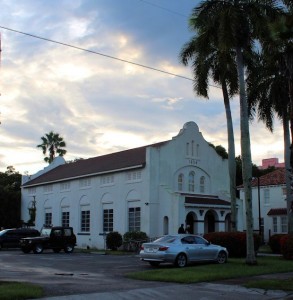 individual and organizational level.
individual and organizational level.
After an exhaustive educational and vetting process overseen by the Southwest Florida Community Foundation, the Rauschenberg Foundation issued five grants totaling $250,00, including a $46,350 grant to the Laboratory Theater of Florida for its Give Youth the Stage program. The other recipients were:
- $48,800 to the Sanibel Captiva Conservation Foundation for its Combining Arts and Sciences to Improve Water Quality in Southwest Florida.
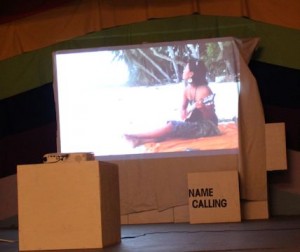 $46,325 to Goodwill Industries of Southwest Florida, Inc. for its Community-Based Bicycle and Walking Audit program.
$46,325 to Goodwill Industries of Southwest Florida, Inc. for its Community-Based Bicycle and Walking Audit program.- $32,000 to the Human Trafficking Awareness Partnerships, Inc. to enhance its ARTREACH program.
- $26,500 to Jewish Family Community Services for its Music Makes Memories program
The Robert Rauschenberg Foundation fosters the 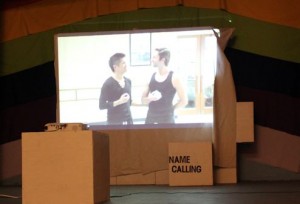 legacy of the artist’s life, work, and philosophy that art can change the world. It works to increase access to Rauschenberg’s art, offer a residency program for artists of all disciplines, and support initiatives at the intersection of arts + issues.
legacy of the artist’s life, work, and philosophy that art can change the world. It works to increase access to Rauschenberg’s art, offer a residency program for artists of all disciplines, and support initiatives at the intersection of arts + issues.
________________________________________________________________________________________














 Tom Hall is both an amateur artist and aspiring novelist who writes art quest thrillers. He is in the final stages of completing his debut novel titled "Art Detective," a story that fictionalizes the discovery of the fabled billion-dollar Impressionist collection of Parisian art dealer Josse Bernheim-Jeune, thought by many to have perished during World War II when the collection's hiding place, Castle de Rastignac in southern France, was destroyed by the Wehrmacht in reprisal for attacks made by members of the Resistance operating in the area. A former tax attorney, Tom holds a bachelor's degree as well as both a juris doctorate and masters of laws in taxation from the University of Florida. Tom lives in Estero, Florida with his fiancee, Connie, and their four cats.
Tom Hall is both an amateur artist and aspiring novelist who writes art quest thrillers. He is in the final stages of completing his debut novel titled "Art Detective," a story that fictionalizes the discovery of the fabled billion-dollar Impressionist collection of Parisian art dealer Josse Bernheim-Jeune, thought by many to have perished during World War II when the collection's hiding place, Castle de Rastignac in southern France, was destroyed by the Wehrmacht in reprisal for attacks made by members of the Resistance operating in the area. A former tax attorney, Tom holds a bachelor's degree as well as both a juris doctorate and masters of laws in taxation from the University of Florida. Tom lives in Estero, Florida with his fiancee, Connie, and their four cats.